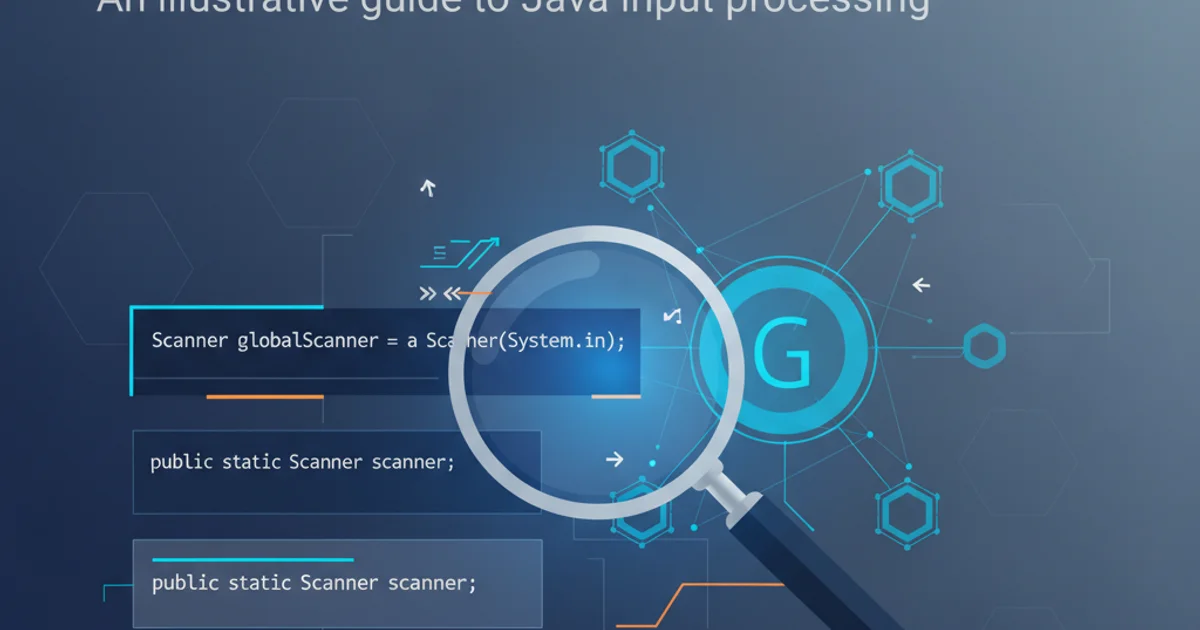Setting a scanner as a global variable
Categories:
Mastering Global Scanners in Java: Best Practices and Pitfalls

Explore the implications of using a global Scanner object in Java, understand its lifecycle, and learn best practices for managing input resources effectively.
In Java programming, handling user input is a fundamental task, often accomplished using the java.util.Scanner class. While it might seem convenient to declare a Scanner object as a global variable for easy access throughout an application, this approach can lead to subtle yet significant issues, particularly concerning resource management and application stability. This article delves into the pros and cons of using a global Scanner, provides practical examples, and outlines best practices to ensure your Java applications handle input robustly.
The Allure and Danger of Global Scanners
A global Scanner object, typically declared as a static final field, offers the apparent benefit of being accessible from any part of your class without needing to be passed around or re-instantiated. This can simplify code in small, single-threaded applications. However, the Scanner class wraps an underlying input stream (like System.in), and improper management of this stream can cause problems. Closing a Scanner also closes its underlying stream. If System.in is closed, it cannot be reopened for the lifetime of the Java Virtual Machine (JVM), effectively preventing any further input operations.
flowchart TD
A[Application Start] --> B{Global Scanner Instantiated}
B --> C{Multiple Methods Use Scanner}
C --> D{One Method Closes Scanner}
D --> E{Subsequent Methods Try to Use Scanner}
E --> F["Error: `System.in` is Closed!"]
F --> G[Application Failure]Flowchart illustrating the danger of closing a global Scanner
Why System.in Should Not Be Closed Prematurely
System.in is a standard input stream provided by the JVM. It's a shared resource for the entire application. When you create a Scanner with new Scanner(System.in), that Scanner takes ownership of System.in. Calling scanner.close() on such a Scanner will also close System.in. This is problematic because System.in is generally expected to remain open for the entire duration of the application, allowing different parts of the program (or even different threads) to read input as needed. Once System.in is closed, it's gone for good, leading to NoSuchElementException or other runtime errors if subsequent code attempts to read from it.
import java.util.Scanner;
public class GlobalScannerProblem {
private static final Scanner GLOBAL_SCANNER = new Scanner(System.in);
public static void main(String[] args) {
readFirstInput();
readSecondInput(); // This will fail if readFirstInput() closed the scanner
}
public static void readFirstInput() {
System.out.print("Enter first name: ");
String name = GLOBAL_SCANNER.nextLine();
System.out.println("Hello, " + name);
// GLOBAL_SCANNER.close(); // DANGER! Do NOT uncomment this line
}
public static void readSecondInput() {
System.out.print("Enter second name: ");
String name = GLOBAL_SCANNER.nextLine(); // Will throw error if scanner is closed
System.out.println("Hello again, " + name);
}
}
Example demonstrating the potential issue with closing a global Scanner.
close() on a Scanner that wraps System.in unless you are absolutely certain that no other part of your application will ever need to read from standard input again. In most typical applications, System.in should remain open.Recommended Alternatives for Input Handling
Instead of a global Scanner, consider these more robust and maintainable approaches for handling input:
1. Pass Scanner as a Parameter
For methods that require input, pass the Scanner object as an argument. This makes dependencies explicit and allows each method to use the same Scanner instance without creating new ones or relying on a global state. The Scanner can be created once in main or a central utility class and then passed around.
2. Create Local Scanners for File/String Input
If you're reading from files or strings, create a new Scanner instance locally within the method that needs it. These Scanner instances should always be closed using a try-with-resources statement to ensure proper resource management.
3. Use a Singleton or Utility Class (Carefully)
If you absolutely need a single point of access for System.in, you can create a utility class with a static method that returns a shared Scanner instance. However, this instance should never be closed by any method other than a dedicated shutdown hook, if at all. The Scanner for System.in is often left open for the entire application lifecycle.
import java.util.Scanner;
public class BetterInputHandling {
public static void main(String[] args) {
try (Scanner scanner = new Scanner(System.in)) { // Scanner for System.in created once
processUserInput(scanner);
anotherInputTask(scanner);
}
// Scanner 'scanner' is automatically closed here, closing System.in
// This is acceptable if main() is the only place System.in is used.
}
public static void processUserInput(Scanner inputScanner) {
System.out.print("Enter your age: ");
if (inputScanner.hasNextInt()) {
int age = inputScanner.nextInt();
System.out.println("You are " + age + " years old.");
} else {
System.out.println("Invalid age input.");
inputScanner.next(); // Consume the invalid input
}
}
public static void anotherInputTask(Scanner inputScanner) {
System.out.print("Enter your city: ");
String city = inputScanner.next();
System.out.println("You live in " + city + ".");
}
// Example for file input - local scanner, properly closed
public static void readFileContent(String filePath) {
try (Scanner fileScanner = new Scanner(new java.io.File(filePath))) {
while (fileScanner.hasNextLine()) {
System.out.println(fileScanner.nextLine());
}
} catch (java.io.FileNotFoundException e) {
System.err.println("File not found: " + filePath);
}
}
}
Demonstrates passing a Scanner as a parameter and using try-with-resources for file input.
System.in, it's often best to create a single Scanner instance in your main method or a dedicated input utility, and then pass that instance to any methods that need to read from standard input. Avoid closing this Scanner until the very end of your application's lifecycle, if at all.